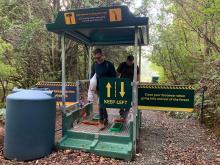Biosecurity practices to support plant health: a review of knowledge and practice

Outwith the plant-based trade sectors there are aspects of biosecurity practice for which advice remains unclear or there are no commonly agreed best practices. Two broad situations needing further evidence are 1) sites which are visited by many people, and 2) moving machinery and equipment between sites. The project will address three aspects of biosecurity where evidence is lacking:
• How can important plant species in botanic collections and historic gardens be protected from inadvertent disease introduction on the footwear, etc. of visitors?
• What is the risk of further inadvertent spread from gardens into the natural environment?
• How can gardens, nurseries, farms and the natural environment be protected from pest and disease spread through the movement of large machinery (e.g., tree harvesting machines)?
Through a desk based study that incudes literature review, contact with plant health authorities, semi-structured interviews with landowners and expert practitioners from other sectors, the project will; determine what official biosecurity advice already exists and procedures are in place in Scotland; explore other sectors which provide additional novel approaches to biosecurity; and carry out a thorough assessment of what procedures are in place, or being considered and developed, in different countries/regions to address these specific biosecurity risks.
• How can important plant species in botanic collections and historic gardens be protected from inadvertent disease introduction on the footwear, etc. of visitors?
• What is the risk of further inadvertent spread from gardens into the natural environment?
• How can gardens, nurseries, farms and the natural environment be protected from pest and disease spread through the movement of large machinery (e.g., tree harvesting machines)?
Through a desk based study that incudes literature review, contact with plant health authorities, semi-structured interviews with landowners and expert practitioners from other sectors, the project will; determine what official biosecurity advice already exists and procedures are in place in Scotland; explore other sectors which provide additional novel approaches to biosecurity; and carry out a thorough assessment of what procedures are in place, or being considered and developed, in different countries/regions to address these specific biosecurity risks.
Position:
Impact Officer: Horticulture and the Natural Environment
Institution: Royal Botanic Garden Edinburgh
Position:
Freelance Forester and Horticulturalist / Sylva Foundation Scotland Representative and Resilience Associate
